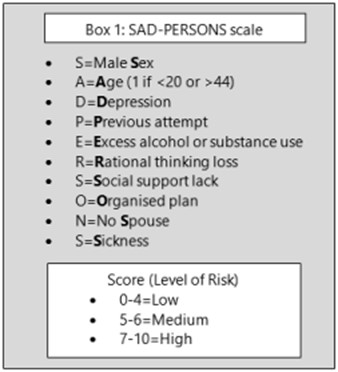A nurse is caring for a client following a suicide attempt. The client has a history of depression, substance abuse, and anorexia nervosa. Which of the following actions is the nurse's priority?
Initiating suicide precautions
Administering the Hamilton Depression Scale
Making a contract with the client for eating behavior
Reviewing the client's toxicology laboratory report
The Correct Answer is A
In this scenario, the nurse's priority should be initiating suicide precautions. Safety is of utmost importance when caring for a client following a suicide attempt. By implementing suicide precautions, the nurse can take steps to ensure the client's physical and emotional well-being, such as removing potential means of self-harm and closely monitoring the client's behavior. This action aims to prevent further harm and promote a safe environment for the client.
Incorrect:
B- Administering the Hamilton Depression Scale: While assessing the client's level of depression is important, it is not the priority in this situation. The client has just attempted suicide, indicating a high level of risk. Therefore, the nurse should prioritize safety measures and immediate interventions rather than administering a depression scale.
C- Making a contract with the client for eating behavior: While addressing the client's eating behavior is important, it is not the priority in this situation. The client has just attempted suicide, indicating a significant risk to their life. Ensuring their safety and providing appropriate mental health support take precedence over addressing their eating behavior.
D- Reviewing the client's toxicology laboratory report: While reviewing the client's toxicology report may provide valuable information about substance abuse, it is not the priority in this scenario. The immediate concern is the client's safety following a suicide attempt. The nurse should focus on implementing suicide precautions and addressing the client's emotional and physical well-being.

Nursing Test Bank
Naxlex Comprehensive Predictor Exams
Related Questions
Correct Answer is D
Explanation
In this scenario, a priority action for the nurse is to ask the client if she has considered harming her newborn. The client's symptoms of feeling "down," sadness, lack of energy, and wanting to cry raise concerns about the possibility of postpartum depression, which is a serious mental health condition that can affect new mothers. In some cases, postpartum depression can lead to thoughts of harming oneself or the newborn. Therefore, it is crucial for the nurse to assess the client's risk and ensure the safety of both the client and her baby.
Incorrect:
A- Reinforce postpartum and newborn care discharge teaching: While reinforcing postpartum and newborn care discharge teaching is an important aspect of care, it is not the priority in this situation. The client's symptoms of feeling "down," sadness, lack of energy, and wanting to cry suggest the possibility of postpartum depression. The nurse should prioritize addressing the client's emotional well-being and assessing for potential risks, rather than focusing on routine postpartum and newborn care teaching.
B- Anticipate a prescription by the provider for an antidepressant: While medication may be part of the treatment plan for postpartum depression, it is not the priority action at this stage. The nurse should first assess the client's condition, including the severity of her symptoms and any potential risk of harm to herself or her newborn. Initiating a discussion about medication can come later, in collaboration with the healthcare provider and based on a comprehensive assessment.
C- Assist the family to identify prior use of positive coping skills in family crises: While supporting the client's family and identifying positive coping skills are important, they are not the priority in this scenario. The immediate concern is addressing the client's symptoms and assessing for potential risks associated with postpartum depression. Once the client's immediate safety and emotional needs are addressed, the nurse can involve the family in the care plan and help them identify and utilize positive coping strategies.
Correct Answer is C
Explanation
Diazepam belongs to the benzodiazepine class of drugs and is commonly used to manage the symptoms of alcohol withdrawal. It helps alleviate anxiety, agitation, tremors, and seizures that can occur during alcohol withdrawal. Diazepam has sedative effects and helps prevent and treat alcohol withdrawal seizures by acting on the central nervous system.
Incorrect:
A- Disulfiram is a medication used to support alcohol abstinence by creating unpleasant reactions if alcohol is consumed. It is not typically administered during acute alcohol withdrawal.
B- Naltrexone is used to help individuals with alcohol dependence reduce their alcohol cravings and drinking behavior. It is not typically used during the acute phase of alcohol withdrawal.
D- Acamprosate is a medication used to maintain abstinence from alcohol in individuals who have already stopped drinking. It is not typically used during the acute phase of alcohol withdrawal.
Whether you are a student looking to ace your exams or a practicing nurse seeking to enhance your expertise , our nursing education contents will empower you with the confidence and competence to make a difference in the lives of patients and become a respected leader in the healthcare field.
Visit Naxlex, invest in your future and unlock endless possibilities with our unparalleled nursing education contents today
Report Wrong Answer on the Current Question
Do you disagree with the answer? If yes, what is your expected answer? Explain.
Kindly be descriptive with the issue you are facing.
